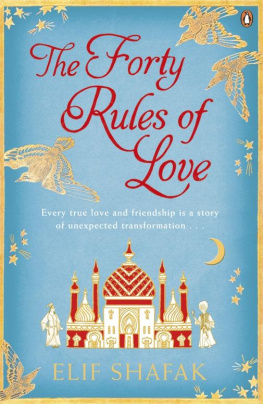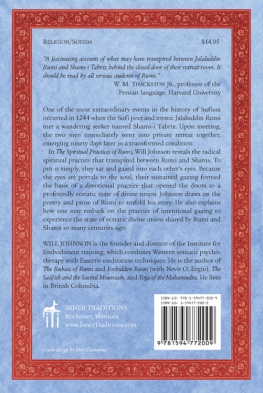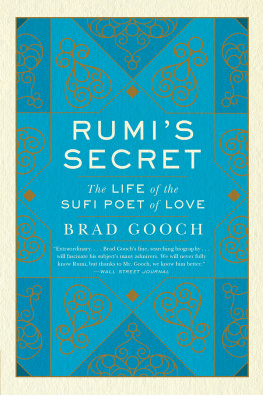The Forty Rules of Love
Elif Shafak is one of Turkeys most acclaimed and outspoken novelists. She was born in 1971 and is the author of six novels, including The Forty Rules of Love, The Bastard of Istanbul, The Gaze, The Saint of Incipient Insanities and The Flea Palace , and one work of non-fiction. She teaches at the University of Arizona and divides her time between the US and Istanbul.
The
Forty Rules
OF Love
ELIF SHAFAK

VIKING
an imprint of
PENGUIN BOOKS
VIKING
Published by the Penguin Group
Penguin Books Ltd, 80 Strand, London WC2R 0RL, England
Penguin Group (USA) Inc., 375 Hudson Street, New York, New York 10014, USA
Penguin Group (Canada), 90 Eglinton Avenue East, Suite 700, Toronto, Ontario, Canada M4P 2Y3 (a division of Pearson Penguin Canada Inc.)
Penguin Ireland, 25 St Stephens Green, Dublin 2, Ireland (a division of Penguin Books Ltd)
Penguin Group (Australia), 250 Camberwell Road, Camberwell, Victoria 3124, Australia (a division of Pearson Australia Group Pty Ltd)
Penguin Books India Pvt Ltd, 11 Community Centre, Panchsheel Park, New Delhi 110 017, India
Penguin Group (NZ), 67 Apollo Drive, Rosedale, North Shore 0632, New Zealand (a division of Pearson New Zealand Ltd)
Penguin Books (South Africa) (Pty) Ltd, 24 Sturdee Avenue, Rosebank, Johannesburg 2196, South Africa
Penguin Books Ltd, Registered Offices: 80 Strand, London WC2R 0RL, England
www.penguin.com
First published in the United States of America by Viking Penguin, a member of Penguin Group (USA) Inc. 2010 First published in Great Britain by Viking 2010
Copyright Elif Shafak, 2010
The moral right of the author has been asserted
Grateful acknowledgement is made for permission to reprint excerpts from the following copyrighted works:Only Breath and Why Wine Is Forbidden from The Essential Rumi , translations by Coleman Barks (HarperCollins). Used by permission of Coleman Barks.
Tattooing in Qazwin from A Year with Rumi: Daily Readings by Coleman Barks. Copyright 2006 by Coleman Barks. Reprinted by permission of HarperCollins Publishers.
This is a work of fiction. Names, characters, places and incidents are either the product of the authors imagination or are used fictitiously, and any resemblance to actual persons, living or dead, or to actual events or locales is entirely coincidental.
All rights reserved
Without limiting the rights under copyright reserved above, no part of this publication may be reproduced, stored in or introduced into a retrieval system, or transmitted, in any form or by any means (electronic, mechanical, photocopying, recording or otherwise), without the prior written permission of both the copyright owner and the above publisher of this book
A CIP catalogue record for this book is available from the British Library
ISBN: 978-0-141-95134-8
To Zahir & Zelda
When I was a child, I saw God, I saw angels; I watched the mysteries of the higher and lower worlds. I thought all men saw the same. At last I realized that they did not see. SHAMS OF TABRIZ
Table of Contents
Prologue
Between your fingers you hold a stone and throw it into flowing water. The effect might not be easy to see. There will be a small ripple where the stone breaks the surface and then a splash, muffled by the rush of the surrounding river. Thats all.
Throw a stone into a lake. The effect will be not only visible but also far more lasting. The stone will disrupt the still waters. A circle will form where the stone hit the water, and in a flash that circle will multiply into another, then another. Before long the ripples caused by one plop will expand until they can be felt everywhere along the mirrored surface of the water. Only when the circles reach the shore will they stop and die out.
If a stone hits a river, the river will treat it as yet another commotion in its already tumultuous course. Nothing unusual. Nothing unmanageable.
If a stone hits a lake, however, the lake will never be the same again.
For forty years Ella Rubinsteins life had consisted of still watersa predictable sequence of habits, needs, and preferences. Though it was monotonous and ordinary in many ways, she had not found it tiresome. During the last twenty years, every wish she had, every person she befriended, and every decision she made was filtered through her marriage. Her husband, David, was a successful dentist who worked hard and made a lot of money. She had always known that they did not connect on any deep level, but connecting emotionally need not be a priority on a married couples list, she thought, especially for a man and a woman who had been married for so long. There were more important things than passion and love in a marriage, such as understanding, affection, compassion, and that most godlike act a person could perform, forgiveness. Love was secondary to any of these. Unless, that is, one lived in novels or romantic movies, where the protagonists were always larger than life and their love nothing short of legend.
Ellas children topped her list of priorities. They had a beautiful daughter in college, Jeannette, and teenage twins, Orly and Avi. Also, they had a twelve-year-old golden retriever, Spirit, who had been Ellas walking buddy in the mornings and her cheeriest companion ever since hed been a puppy. Now he was old, overweight, completely deaf, and almost blind; Spirits time was coming, but Ella preferred to think he would go on forever. Then again, that was how she was. She never confronted the death of anything, be it a habit, a phase, or a marriage, even when the end stood right in front of her, plain and inevitable.
The Rubinsteins lived in Northampton, Massachusetts, in a large Victorian house that needed some renovation but still was splendid, with five bedrooms, three baths, shiny hardwood floors, a three-car garage, French doors, and, best of all, an outdoor Jacuzzi. They had life insurance, car insurance, retirement plans, college savings plans, joint bank accounts, and, in addition to the house they lived in, two prestigious apartments: one in Boston, the other in Rhode Island. She and David had worked hard for all this. A big, busy house with children, elegant furniture, and the wafting scent of homemade pies might seem a clich to some people, but to them it was the picture of an ideal life. They had built their marriage around this shared vision and had attained most, if not all, of their dreams.
On their last Valentines Day, her husband had given her a heart-shaped diamond pendant and a card that read,
To my dear Ella, A woman with a quiet manner, a generous heart, and the patience of a saint. Thank you for accepting me as I am. Thank you for being my wife. Yours, David
Ella had never confessed this to David, but reading his card had felt like reading an obituary. This is what they will write about me when I die, she had thought. And if they were sincere, they might also add this:
Building her whole life around her husband and children, Ella lacked any survival techniques to help her cope with lifes hardships on her own. She was not the type to throw caution to the wind. Even changing her daily coffee brand was a major effort.
All of which is why no one, including Ella, could explain what was going on when she filed for divorce in the fall of 2008 after twenty years of marriage.

But there was a reason: love.
They did not live in the same city. Not even on the same continent. The two of them were not only miles apart but also as different as day and night. Their lifestyles were so dissimilar that it seemed impossible for them to bear each others presence, never mind fall in love. But it happened. And it happened fast, so fast in fact that Ella had no time to realize what was happening and to be on guard, if one could ever be on guard against love.
Next page









